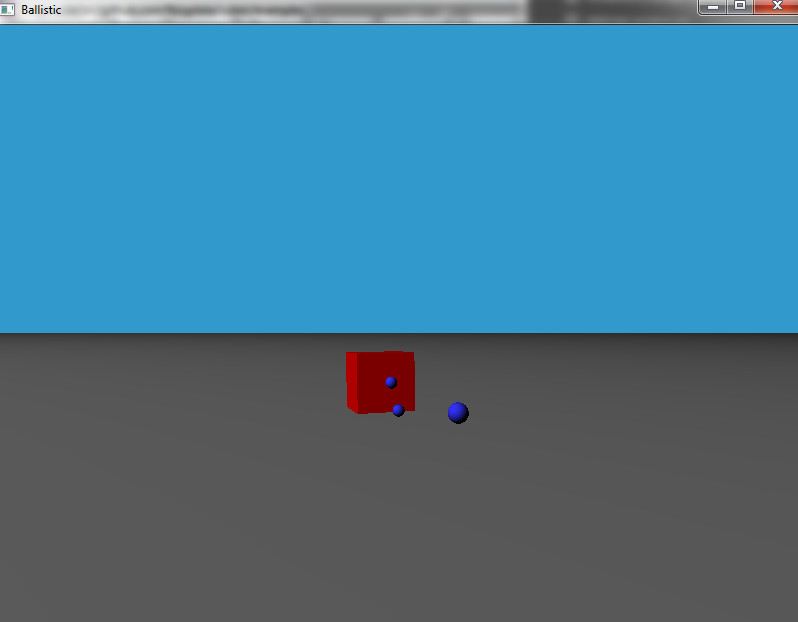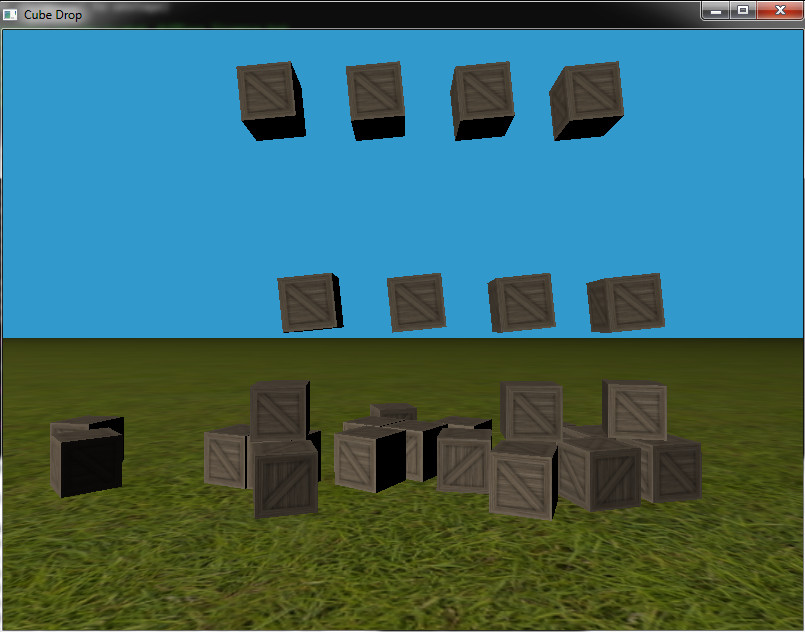 Documentation
¶
Documentation
¶
Index ¶
- func ResolveContacts(maxIterations int, contacts []*Contact, duration m.Real)
- type Collider
- type CollisionCube
- func (cube *CollisionCube) CalculateDerivedData()
- func (cube *CollisionCube) CheckAgainstCube(secondCube *CollisionCube, existingContacts []*Contact) (bool, []*Contact)
- func (cube *CollisionCube) CheckAgainstHalfSpace(plane *CollisionPlane, existingContacts []*Contact) (bool, []*Contact)
- func (cube *CollisionCube) CheckAgainstSphere(sphere *CollisionSphere, existingContacts []*Contact) (bool, []*Contact)
- func (cube *CollisionCube) Clone() Collider
- func (cube *CollisionCube) GetBody() *RigidBody
- func (cube *CollisionCube) GetTransform() m.Matrix3x4
- type CollisionPlane
- func (p *CollisionPlane) CalculateDerivedData()
- func (p *CollisionPlane) CheckAgainstCube(cube *CollisionCube, existingContacts []*Contact) (bool, []*Contact)
- func (p *CollisionPlane) CheckAgainstHalfSpace(plane *CollisionPlane, existingContacts []*Contact) (bool, []*Contact)
- func (p *CollisionPlane) CheckAgainstSphere(sphere *CollisionSphere, existingContacts []*Contact) (bool, []*Contact)
- func (p *CollisionPlane) Clone() Collider
- func (p *CollisionPlane) GetBody() *RigidBody
- func (p *CollisionPlane) GetTransform() m.Matrix3x4
- type CollisionSphere
- func (s *CollisionSphere) CalculateDerivedData()
- func (s *CollisionSphere) CheckAgainstCube(cube *CollisionCube, existingContacts []*Contact) (bool, []*Contact)
- func (s *CollisionSphere) CheckAgainstHalfSpace(plane *CollisionPlane, existingContacts []*Contact) (bool, []*Contact)
- func (s *CollisionSphere) CheckAgainstSphere(secondSphere *CollisionSphere, existingContacts []*Contact) (bool, []*Contact)
- func (s *CollisionSphere) Clone() Collider
- func (s *CollisionSphere) GetBody() *RigidBody
- func (s *CollisionSphere) GetTransform() m.Matrix3x4
- type Contact
- type RigidBody
- func (body *RigidBody) AddRotation(v *m.Vector3)
- func (body *RigidBody) AddVelocity(v *m.Vector3)
- func (body *RigidBody) CalculateDerivedData()
- func (body *RigidBody) ClearAccumulators()
- func (body *RigidBody) Clone() *RigidBody
- func (body *RigidBody) GetInverseInertiaTensorWorld() m.Matrix3
- func (body *RigidBody) GetInverseMass() m.Real
- func (body *RigidBody) GetLastFrameAccelleration() m.Vector3
- func (body *RigidBody) GetMass() m.Real
- func (body *RigidBody) GetTransform() m.Matrix3x4
- func (body *RigidBody) HasFiniteMass() bool
- func (body *RigidBody) Integrate(duration m.Real)
- func (body *RigidBody) SetAwake(awake bool)
- func (body *RigidBody) SetInertiaTensor(m *m.Matrix3)
- func (body *RigidBody) SetInfiniteMass()
- func (body *RigidBody) SetMass(mass m.Real)
Constants ¶
This section is empty.
Variables ¶
This section is empty.
Functions ¶
func ResolveContacts ¶
ResolveContacts results a set of contacts for both penetration and velocity.
NOTE: Contacts that cannot interact with each other should be passed to separate calls of ResolveContacts for performance reasons.
Types ¶
type Collider ¶
type Collider interface {
Clone() Collider
CalculateDerivedData()
GetBody() *RigidBody
GetTransform() m.Matrix3x4
CheckAgainstHalfSpace(plane *CollisionPlane, existingContacts []*Contact) (bool, []*Contact)
CheckAgainstSphere(sphere *CollisionSphere, existingContacts []*Contact) (bool, []*Contact)
CheckAgainstCube(secondCube *CollisionCube, existingContacts []*Contact) (bool, []*Contact)
}
Collider is an interface for collision primitive objects to make calculating collisions amongst a heterogenous set of objects easier.
This interface can be used in conjuection with CheckForCollisions() to check for collision between two primitives without having to switch on types in client code.
type CollisionCube ¶
type CollisionCube struct {
// Body is the RigidBody that is represented by this collision object.
Body *RigidBody
// Offset is the matrix that gives the offset of this primitive from Body.
Offset m.Matrix3x4
// Halfsize holds the cube's half-sizes along each of its local axes.
HalfSize m.Vector3
// contains filtered or unexported fields
}
CollisionCube is a rigid body that can be considered an axis-alligned cube for contact collision.
func NewCollisionCube ¶
func NewCollisionCube(optBody *RigidBody, halfSize m.Vector3) *CollisionCube
NewCollisionCube creates a new CollisionCube object with the dimensions specified for a given RigidBody. If a RigidBody is not specified, then a new RigidBody object is created for the new collider object.
func (*CollisionCube) CalculateDerivedData ¶
func (cube *CollisionCube) CalculateDerivedData()
CalculateDerivedData internal data from public data members.
Constructs a transform matrix based on the RigidBody's transform and the collision object's offset.
func (*CollisionCube) CheckAgainstCube ¶
func (cube *CollisionCube) CheckAgainstCube(secondCube *CollisionCube, existingContacts []*Contact) (bool, []*Contact)
CheckAgainstCube checks for collisions against another cube.
func (*CollisionCube) CheckAgainstHalfSpace ¶
func (cube *CollisionCube) CheckAgainstHalfSpace(plane *CollisionPlane, existingContacts []*Contact) (bool, []*Contact)
CheckAgainstHalfSpace does a collision test on a collision box and a plane representing a half-space (i.e. the normal of the plane points out of the half-space).
func (*CollisionCube) CheckAgainstSphere ¶
func (cube *CollisionCube) CheckAgainstSphere(sphere *CollisionSphere, existingContacts []*Contact) (bool, []*Contact)
CheckAgainstSphere checks the cube against a sphere to see if there's a collision.
func (*CollisionCube) Clone ¶
func (cube *CollisionCube) Clone() Collider
Clone makes a new copy of the CollisionCube object
func (*CollisionCube) GetBody ¶
func (cube *CollisionCube) GetBody() *RigidBody
GetBody returns the rigid body associated with the cube.
func (*CollisionCube) GetTransform ¶
func (cube *CollisionCube) GetTransform() m.Matrix3x4
GetTransform returns a copy of the transform matrix for the collider object.
type CollisionPlane ¶
type CollisionPlane struct {
// Normal is the plane's normal vector
Normal m.Vector3
// Offset is the distance of the plane from the origin
Offset m.Real
}
CollisionPlane represents a plane in space for collisions but doesn't have an associated rigid body and is considered to be infinite. It's primarily useful for rerepresenting immovable world geometry like a giant ground plane.
func NewCollisionPlane ¶
func NewCollisionPlane(n m.Vector3, o m.Real) *CollisionPlane
NewCollisionPlane creates a new CollisionPlane object with the normal and offset specified.
func (*CollisionPlane) CalculateDerivedData ¶
func (p *CollisionPlane) CalculateDerivedData()
CalculateDerivedData currently doesn't do anything for planes.
func (*CollisionPlane) CheckAgainstCube ¶
func (p *CollisionPlane) CheckAgainstCube(cube *CollisionCube, existingContacts []*Contact) (bool, []*Contact)
CheckAgainstCube checks for collisions against a cube.
func (*CollisionPlane) CheckAgainstHalfSpace ¶
func (p *CollisionPlane) CheckAgainstHalfSpace(plane *CollisionPlane, existingContacts []*Contact) (bool, []*Contact)
CheckAgainstHalfSpace doesn't return collisions against another plane, so this implementation is empty.
func (*CollisionPlane) CheckAgainstSphere ¶
func (p *CollisionPlane) CheckAgainstSphere(sphere *CollisionSphere, existingContacts []*Contact) (bool, []*Contact)
CheckAgainstSphere checks for collisions against a sphere.
func (*CollisionPlane) Clone ¶
func (p *CollisionPlane) Clone() Collider
Clone makes a new copy of the CollisionPlane object
func (*CollisionPlane) GetBody ¶
func (p *CollisionPlane) GetBody() *RigidBody
GetBody returns nil since the plane doesn't have a rigid body associated with it
func (*CollisionPlane) GetTransform ¶
func (p *CollisionPlane) GetTransform() m.Matrix3x4
GetTransform returns an identity transform since the collision plane doesn't use transform matrixes.
type CollisionSphere ¶
type CollisionSphere struct {
// Body is the RigidBody that is represented by this collision object.
Body *RigidBody
// Offset is the matrix that gives the offset of this primitive from Body.
Offset m.Matrix3x4
// Radius is the radius of the sphere.
Radius m.Real
// contains filtered or unexported fields
}
CollisionSphere is a rigid body that can be considered a sphere for collision detection.
func NewCollisionSphere ¶
func NewCollisionSphere(optBody *RigidBody, radius m.Real) *CollisionSphere
NewCollisionSphere creates a new CollisionSphere object with the radius specified for a given RigidBody. If a RigidBody is not specified, then a new RigidBody object is created for the new collider object.
func (*CollisionSphere) CalculateDerivedData ¶
func (s *CollisionSphere) CalculateDerivedData()
CalculateDerivedData internal data from public data members.
Constructs a transform matrix based on the RigidBody's transform and the collision object's offset.
func (*CollisionSphere) CheckAgainstCube ¶
func (s *CollisionSphere) CheckAgainstCube(cube *CollisionCube, existingContacts []*Contact) (bool, []*Contact)
CheckAgainstCube checks the sphere against collision with a cube.
func (*CollisionSphere) CheckAgainstHalfSpace ¶
func (s *CollisionSphere) CheckAgainstHalfSpace(plane *CollisionPlane, existingContacts []*Contact) (bool, []*Contact)
CheckAgainstHalfSpace does a collision test on a collision sphere and a plane representing a half-space (i.e. the normal of the plane points out of the half-space).
func (*CollisionSphere) CheckAgainstSphere ¶
func (s *CollisionSphere) CheckAgainstSphere(secondSphere *CollisionSphere, existingContacts []*Contact) (bool, []*Contact)
CheckAgainstSphere checks the sphere against collision with another sphere.
func (*CollisionSphere) Clone ¶
func (s *CollisionSphere) Clone() Collider
Clone makes a new copy of the CollisionSphere object
func (*CollisionSphere) GetBody ¶
func (s *CollisionSphere) GetBody() *RigidBody
GetBody returns the rigid body associated with the sphere.
func (*CollisionSphere) GetTransform ¶
func (s *CollisionSphere) GetTransform() m.Matrix3x4
GetTransform returns a copy of the transform matrix for the collider object.
type Contact ¶
type Contact struct {
// Bodies holds 1 or 2 bodies involved in the contact; second body can be nil
Bodies [2]*RigidBody
// Friction holds the lateral friction coefficient at the contact
Friction m.Real
// Restitution holdes the normal restitution coefficient at the contact
Restitution m.Real
// ContactPoint is the position of the contact in World Space
ContactPoint m.Vector3
// ContactNormal is the direction of the contact in World Space
ContactNormal m.Vector3
// Penetration is the depth of penetration at the contact point. If
// both Bodies are set, then this should be midway between the
// inter-penetrating points.
Penetration m.Real
// contains filtered or unexported fields
}
Contact holds all of the data associated with a contact between two collider primitives.
func CheckForCollisions ¶
CheckForCollisions will check one collider primitive against another and update the contact slice if there were any contacts (as well as returning a bool indicating if contacts were found).
type RigidBody ¶
type RigidBody struct {
// LinearDamping holds the amount of damping applied to the linear motion
// of the RigidBody. This is required to remove energy that might get
// added due to the numerical instability of floating point operations.
LinearDamping m.Real
// AngularDamping holds the amount of damping applied to angular modtion
// of the RigidBody. Damping is required to remove energy added through
// numerical instability in the integrator.
AngularDamping m.Real
// Position is the position of the RigidBody in World Space.
Position m.Vector3
// Orientation is the angular orientation of the RigidBody.
Orientation m.Quat
// Velocity is the linear velocity of the RigidBody in World Space.
Velocity m.Vector3
// Acceleration is the acceleration of the RigidBody and can be
// used to set acceleration due to gravity or any other constant
// acceleration desired.
Acceleration m.Vector3
// Rotation holds the angular velocity, or rotation, of the rigid body in World Space.
Rotation m.Vector3
// InverseInertiaTensor holds the inverse of the rigid body's inertia tensor.
// The inertia tensor provided must not be degenerate (that would mean the
// body had zero inertia for spinning along one axis). As long as the tensor
// is finite, it will be invertible. The inverse tensor is used for similar
// reasons to the use of the inverse mass.
// NOTE: this is given in Body Space.
InverseInertiaTensor m.Matrix3
// IsAwake indicates if the RigidBody is awake and should be updated
// upon integration.
// Defaults to true.
IsAwake bool
// CanSleep indicates if the RigidBody is allowed to 'sleep' or
// if it should always be awake.
// Defaults to true.
CanSleep bool
// contains filtered or unexported fields
}
RigidBody is the main data structure represending an object that can cause collisions and move around in the physics simulation.
func NewRigidBody ¶
func NewRigidBody() *RigidBody
NewRigidBody creates a new RigidBody object and returns it.
func (*RigidBody) AddRotation ¶
AddRotation adds the vector to the RigidBody's Rotation property.
func (*RigidBody) AddVelocity ¶
AddVelocity adds the vector to the RigidBody's Velocity property.
func (*RigidBody) CalculateDerivedData ¶
func (body *RigidBody) CalculateDerivedData()
CalculateDerivedData internal data from public data members.
NOTE: This should be called after the RigidBody's state is alterted directly by client code; it is called automatically during integration.
Particularly, call this after modifying:
Position, Orientation
func (*RigidBody) ClearAccumulators ¶
func (body *RigidBody) ClearAccumulators()
ClearAccumulators resets all of the stored linear and torque forces stored in the body.
func (*RigidBody) Clone ¶
Clone makes a new RigidBody object with the current data of the RigidBody this is called on.
func (*RigidBody) GetInverseInertiaTensorWorld ¶
GetInverseInertiaTensorWorld returns a copy of the RigidBody's inverse inertia tensor in World Space.
func (*RigidBody) GetInverseMass ¶
GetInverseMass gets the inverse mass of the RigidBody object.
func (*RigidBody) GetLastFrameAccelleration ¶
GetLastFrameAccelleration returns a copy of the RigidBody's linear accelleration for the last frame.
func (*RigidBody) GetTransform ¶
GetTransform returns a copy of the RigidBody's calculated transform matrix
func (*RigidBody) HasFiniteMass ¶
HasFiniteMass returns true if the RigidBody has a finite mass (not infinite).
func (*RigidBody) Integrate ¶
Integrate takes all of the forces accumulated in the RigidBody and change the Position and Orientation of the object.
func (*RigidBody) SetAwake ¶
SetAwake sets the IsAwake property of the RigidBody. NOTE: this function doesn't respect CanSleep.
func (*RigidBody) SetInertiaTensor ¶
SetInertiaTensor sets the InverseInertiaTensor member of the RigidBody by calculating the inverse of the matrix supplied.
func (*RigidBody) SetInfiniteMass ¶
func (body *RigidBody) SetInfiniteMass()
SetInfiniteMass sets the mass of the RigidBody object to be 'infinite' ... which actually just sets the inverse mass to 0.0.

